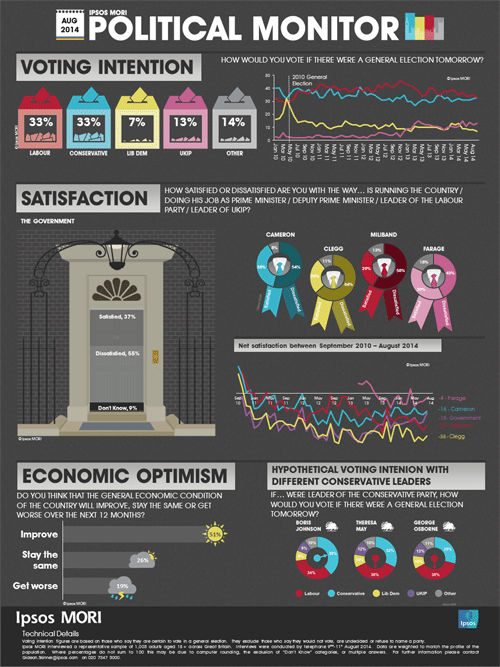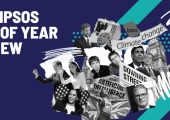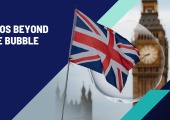Economic optimism up to second highest ever but three in ten are still worried about paying the bills
Ipsos's latest Economic Optimism Index shows that half the public (51%) believe that general economic condition of the country will improve over the next 12 months.
Ipsos’s latest Economic Optimism Index shows that half the public (51%) believe that general economic condition of the country will improve over the next 12 months. One in five (19%) think the economy will get worse, and a quarter that it will stay the same, giving an Economic Optimism Index (% think get better minus % think will get worse) of +32. This is the second highest in the history of the Index, first started in 1978, beaten only by the record high of +35 in May this year, and is up from +25 in June.
However, the cost of living is still a concern for many. Three in ten (31%) worry about their ability to pay the bills (although this is a slight decrease from 37% in October 2011). Similar proportions are concerned about interest rates going up (31%), the loss of their own or family member’s job (30%), and their children’s job prospects (29%). This follows our finding in April this year that eight in ten Britons agree there is a “cost of living crisis” in the UK.
The survey also asked which of the three main leaders people would most like to spend time with on holiday. David Cameron led with 26%, with Labour leader Ed Miliband and Deputy Prime Minister Nick Clegg tied at 15% - although even more, 40%, said ‘none of them’. Ed Miliband is the least popular leader that people would like to spend time with on holiday (37%), followed by David Cameron on 28% and Nick Clegg on 18%. All the party leaders split opinion between their own and other parties’ supporters.

Also on the question of leadership, the survey suggests Britain is split over David Cameron’s response to the Gaza conflict. When asked which statement was closest to their view, 41% think that David Cameron should have been more critical of Israel whereas 38% say David Cameron has got the balance right between supporting and criticising Israel. This is followed by 13% who don’t know and only 9% who think that the Prime Minister should be more supportive of Israel.
Gideon Skinner, Head of Political Research at Ipsos, said:
“The economy remains a key issue, and we see both sides to public opinion in this survey. After the news that the UK economy has returned to pre-crisis levels, we see yet another peak in general economic optimism to near record highs. But despite these improvements, the cost of living is still a concern for many people. "Meanwhile, given the general lack of trust in MPs, it’s not surprising that many people wouldn’t pick a politician as an ideal holiday companion. But while all the leaders split opinion between their own and opposing party supporters, it’s Ed Miliband who has the biggest problem – despite his recent speech that he is trying to offer something different. Our research shows that it is as much on the classic Prime Ministerial attributes that the public compare him poorly to David Cameron, although that hasn’t stopped Labour having the lead for most of his tenure.”
Technical note
Ipsos interviewed a representative sample of 1,003 adults aged 18+ across Great Britain. Interviews were conducted by telephone 9th – 11th August 2014. Data are weighted to match the profile of the population.
Where percentages do not sum to 100 this may be due to computer rounding, the exclusion of “don’t know” categories, or multiple answers. An asterisk (*) denotes any value of less than half a per cent. Voting intention figures exclude those who say they would not vote, are undecided or refuse to name a party and in the headline figures, those who are not absolutely certain to vote. Data are based on all adults unless otherwise stated.
From August 2014, Ipsos has started including a small proportion of mobile numbers in its Political Monitor sample. Our testing has shown this makes no significant difference to our figures. More details on our methodology.
More insights about Public Sector



